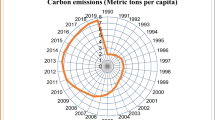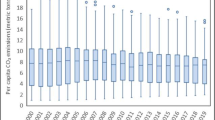Abstract
This study explores the intricate legal dynamics surrounding industrial productivity within the context of China's digital economy, shedding light on the enduring issue of energy poverty and the nation's transition toward a sustainable energy landscape. Spanning the period from 1990 to 2021 and encompassing all 30 provinces of China, our analysis employs a comprehensive econometric model to uncover the multifaceted relationships between legal frameworks, energy development, and the digital economy. The results of this study reveal the profound impact of legal regulations on energy accessibility and affordability, emphasizing the critical role of transport infrastructure in bridging regional disparities. Furthermore, our findings underscore the transformative potential of China's digital economy in mitigating energy poverty while driving industrial growth. The study findings suggest that policy implications should prioritize the development of a cohesive legal framework incentivizing sustainable energy practices, promoting equitable energy distribution, and harnessing digital innovations to drive China's inclusive and environmentally responsible economic future.
Similar content being viewed by others
References
D Bogdanov M Ram A Aghahosseini A Gulagi AS Oyewo M Child U Caldera K Sadovskaia J Farfan L De Souza Noel Simas Barbosa M Fasihi S Khalili T Traber C Breyer 2021 Low-cost renewable electricity as the key driver of the global energy transition towards sustainability Energy 23 227 https://doi.org/10.1016/j.energy.2021.120467
S Carley DM Konisky 2020 The justice and equity implications of the clean energy transition Nat Energy 5 8 569 577 https://doi.org/10.1038/S41560-020-0641-6
X Cui M Umair G Ibragimove Gayratovich A Dilanchiev 2023 Do remittances mitigate poverty? An empirical evidence from 15 selected asian economies Singapore Econ Rev 68 04 1447 1468 https://doi.org/10.1142/S0217590823440034
A Gatto 2022 The energy futures we want: a research and policy agenda for energy transitions Energy Res Soc Sci 89 102639
C Li M Umair 2023a Does green finance development goals affects renewable energy in China Renew Energy 203 898 905 https://doi.org/10.1016/j.renene.2022.12.066
Y Li M Umair 2023b The protective nature of gold during times of oil price volatility: an analysis of the COVID-19 Pandemic Extract Ind Socy https://doi.org/10.1016/j.exis.2023.101284
M Muhammad UM Dilanchiev Azer 2023 The impact of green climate fund portfolio structure on green finance: empirical evidence from EU Countries Ekonomika 102 2 130 144 https://doi.org/10.15388/Ekon.2023.102.2.7
I Overland M Bazilian T Ilimbek Uulu R Vakulchuk K Westphal 2019 The GeGaLo index: geopolitical gains and losses after energy transition Energy Strategy Rev https://doi.org/10.1016/J.ESR.2019.100406
F Si E Du N Zhang Y Wang Y Han 2023 China’s urban energy system transition towards carbon neutrality: challenges and experience of Beijing and Suzhou Renew Sustain Energy Rev 183 113468
BK Sovacool S Griffiths 2020 Culture and low-carbon energy transitions Nat Sustain 3 9 685 693
Umair M, Dilanchiev A (2022) Economic recovery by developing business starategies: mediating role of financing and organizational culture in small and medium businesses. In: Proceedings book, pp 683
A Wågström K Michael 2023 Caring for energy, energy to care: exploring the energy-care nexus through examples from Sweden and India Energy Res Soc Sci https://doi.org/10.1016/j.erss.2023.103042
Q Wu D Yan M Umair 2023 Assessing the role of competitive intelligence and practices of dynamic capabilities in business accommodation of SMEs Econ Anal Policy 77 1103 1114 https://doi.org/10.1016/j.eap.2022.11.024
X Xiuzhen W Zheng M Umair 2022 Testing the fluctuations of oil resource price volatility: a hurdle for economic recovery Resour Policy 79 102982 https://doi.org/10.1016/j.resourpol.2022.102982
Z Yan Z Zhou K Du 2023 How does environmental regulatory stringency affect energy consumption? Evidence from Chinese firms Energy Econ https://doi.org/10.1016/j.eneco.2023.106503
M Yu M Umair Y Oskenbayev Z Karabayeva 2023 Exploring the nexus between monetary uncertainty and volatility in global crude oil: a contemporary approach of regime-switching Resour Policy 85 103886 https://doi.org/10.1016/j.resourpol.2023.103886
H Yuan L Zhao M Umair 2023 Crude oil security in a turbulent world: China’s geopolitical dilemmas and opportunities Extract Ind Soc 16 101334 https://doi.org/10.1016/j.exis.2023.101334
B Zakeri K Paulavets L Barreto-Gomez LG Echeverri S Pachauri B Boza-Kiss C Zimm J Rogelj F Creutzig D Ürge-Vorsatz DG Victor MD Bazilian S Fritz D Gielen DL McCollum L Srivastava JD Hunt S Pouya 2022 Pandemic, war, and global energy transitions Energies 15 17 234 https://doi.org/10.3390/EN15176114
F Zhang 2020 Leaders and followers in finance mobilization for renewable energy in Germany and China Environ Innov Soc Transit 37 203 224 https://doi.org/10.1016/j.eist.2020.08.005
M Zhang S Zhang C-C Lee D Zhou 2021 Effects of trade openness on renewable energy consumption in OECD countries: new insights from panel smooth transition regression modelling Energy Econ 104 105649https://doi.org/10.1016/j.eneco.2021.105649
Y Zhang M Umair 2023 Examining the interconnectedness of green finance: an analysis of dynamic spillover effects among green bonds, renewable energy, and carbon markets Environ Sci Pollut Res https://doi.org/10.1007/s11356-023-27870-w
Funding
Sichuan Provincial Law Society Research on the practice of the rule of law in environmental protection in the upper reaches of the Yangtze River (SCFXSC2109).
Author information
Authors and Affiliations
Corresponding author
Ethics declarations
Conflict of interest
The authors declare no conflict of interest.
Ethical approval and consent to participate
The authors declared that they have no known competing financial interests or personal relationships, which seem to affect the work reported in this article. We declare that we have no human participants, human data, or human issues.
Consent for publication
All participants are shown consent for publication.
Additional information
Publisher's Note
Springer Nature remains neutral with regard to jurisdictional claims in published maps and institutional affiliations.
Rights and permissions
Springer Nature or its licensor (e.g. a society or other partner) holds exclusive rights to this article under a publishing agreement with the author(s) or other rightsholder(s); author self-archiving of the accepted manuscript version of this article is solely governed by the terms of such publishing agreement and applicable law.
About this article
Cite this article
Gao, L. Industrial productive efficiency nexus with energy poverty and energy transition in digital economy: findings of Chinese transport and energy development industries. Econ Change Restruct 57, 48 (2024). https://doi.org/10.1007/s10644-024-09642-9
Received:
Accepted:
Published:
DOI: https://doi.org/10.1007/s10644-024-09642-9




